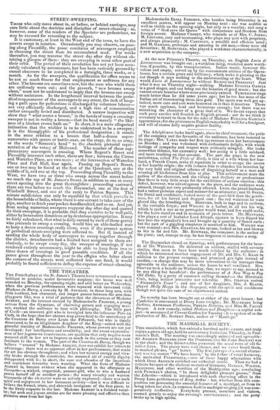STREET-SWEEPING.
THOSE who only move about in, or before, or behind carriages, may care little about the doctrine and discipline of street-cleaning : as, however, some of the readers of the Spectator are pedestrians, we may be excused for returning to the subject.
It is customary, at least in the West end of the town, to have the streets swept in rotation. Occasionally you may observe, on pass- ing along Piccadilly, the posse comitatus of scavengers employed in cleansing the street from its accumulated mud. For weeks thereafter, you may traverse the street day after day without ob- taining a glimpse of them : they are sweeping in some other part of their orbit. The period of their revolution has not yet been accu- rately calculated by astronomers, but has been variously guessed by casual observers to be completed in a fortnight, three weeks, or a month. As for the sweepers, the qualification for office seems to be not so much fitness for that employment as unfitness for any other. The brooms are sometimes new, but the men who wield them are uniformly worn out ; and the proverb, " new brooms sweep clean," must not be understood to imply that the brooms can sweep without assistance. In the lengthened interval between the perio- dical reappearance of the scavengers in any street, the task of keep- ing a path open for pedestrians is discharged by volunteer labour—. not very efficiently discharged, and a high rate of remuneration rather unequally levied and distributed. A narrow inspection will show that " what seems a broom," in the hands of many a crossing- sweeper is not in reality a broom—that its head merely " the like- ness of a birchen crown bath on." In short, it is a mere allegorical intimation that the wielder is to be understood to be a sweeper ; it is the hieroglyphic of his professional designation ; it stands in the same relation to a broom that half-a-dozen super- numeraries with spears or battle-axes, on the stage, do to an army, or the words "Saracen's bead" to the obsolete pictorial repre- sentation of the votary of Mahound. The number of these sup- plementary scavengers is amazing. Where Regent's Street and Piccadilly intersect each other, there are four ; between the Circus and Waterloo Place, are two more ; at the intersection of Waterloo Place and Pall Mall, four again. Passing up Regent's Street, one or two may be found at the foot of the Quadrant, one at the middle of it, and one at the top. Proceeding along Piccadilly to the West, we have two or three who sweep across the street before we reach the top of St. James's Street, in addition to one at every street opening into the great thoroughfare : proceeding eastward, there are two before we reach the Haymarket, one at the foot of Windmill Street, and one at the entry to Panton Square. This minute subdivision can only he equalled by that which prevails in the households of India, where there is one servant to take care of the pipe, another to fetch your pocket-handkerchief, and so on. And yet, from seeing numerous sweepers reappear day after day and quarrel for their sweepings, it is probable that they contrive to be well paid, either by benevolent donations or by dexterous appropriation. It may be fairly calculated, that what is daily earned by each of those gentry who pretends to sweep a crossing, would hire an able-bodied man to keep a dozen crossings really clean, even if the present system of periodical street-sweeping were adhered to. But if, instead of sending the whole body of scavengers to sweep together through the district, detachments had a limited beat assigned to them ex- clusively, to be swept every day, the sweeper of crossings, if not rendered entirely unnecessary, might be able to keep from two to _three dozen of crossings in good passable condition. If all the pence given throughout the year to the effigies who loiter about the corners of the streets were collected into one fund, it would probably be found sufficient to defray the expense of street-cleaning.


























 Previous page
Previous page